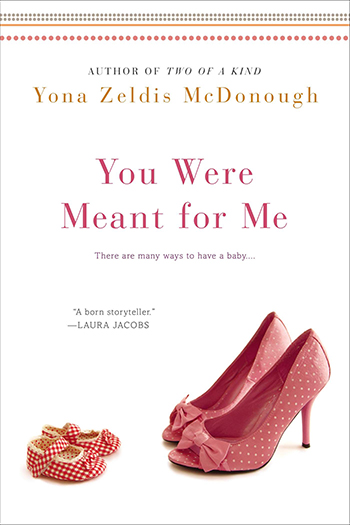The Lilith Blog 1 of 2
October 7, 2014 by Yona Zeldis McDonough
A “Rescue” Baby, a New Novel
 For me, writing a novel usually begins with a character tapping me on the shoulder and whose insistent whisper in my ear urges to me to get the story down, and to get it right. But for my most recent novel, You Were Meant for Me, inspiration came to me in a different way: an actual news event in which a man found a newborn infant on a subway platform and eventually ended up adopting him.
For me, writing a novel usually begins with a character tapping me on the shoulder and whose insistent whisper in my ear urges to me to get the story down, and to get it right. But for my most recent novel, You Were Meant for Me, inspiration came to me in a different way: an actual news event in which a man found a newborn infant on a subway platform and eventually ended up adopting him.
The story would not leave me, and I found myself returning to it again and again in my mind. What had driven that baby’s mother to leave him not in a hospital, police or fire station—safe havens, all—but on a subway platform? And what random stroke of luck or divine intervention averted all the horrific ends to this tale—and there could have been so many—and instead turned it into one of salvation and grace? As I mulled over these questions, it occurred to me that the story was working on another level as well, one that was both mythic and archetypal. The foundling, the infant abandoned and rescued, is motif that occurs over and over in literature and can trace its roots as far back as the Bible. Wasn’t Moses himself a foundling, set in the ark and concealed in the bulrushes by Yocheved, whose fear for his life was so great that she was willing to give him up to save him? And wasn’t Moses rescued by the most unlikely of saviors, an Egyptian princess who found and then raised him as her own?
It was the Moses connection that clinched it for me; this story was too good, and had too much in it, to leave alone: I had to write it. But because I am a novelist and not a journalist, I made several important changes along the way. I turned the man of the real story into Miranda Berenzweig, a single Jewish woman who has not thought of having a child but whose biological clock is nonetheless ticking loudly. I changed the baby boy to a girl. And unlike the real story, in which no one came forth to claim the child, I introduced the birth father, an up-and-coming black real estate broker who did not know he had a daughter. Once his paternity is proven, he steps up to claim her. This plot turn raised issues about what makes a good or fit parent and once again, I found myself in Biblical territory, this time that of Solomon who must adjudicate between two women who come to him with an infant each swears is her own. Both of my characters have a claim to the baby as well but which claim should prevail? That was what I attempted to work out on the page.
Novels can come from surprising sources and lead to equally surprising destinations. I did not know that my reconfiguring a contemporary news story would take me back to the ancient stories that are part of my heritage, and that those stories in turn would offer a surprisingly modern lens through which to view the world.
 Please wait...
Please wait...